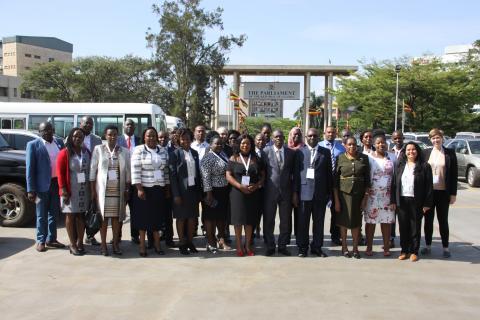
The Center for Learning on Evaluation and Results-Anglophone Africa, (CLEAR -AA) in partnership with the Institute of Parliamentary Studies and the Parliament of Uganda hosted a 'Regional Training Workshop on Research and Evidence Use in Parliamentary Context' aimed at strengthening and implementing a peer learning program for strengthening capacity in African Parliaments. Held from the 23rd to the 25th October 2018 in Kampala, Uganda, the workshop attracted 37 participants from seven countries, namely, South Africa, Malawi, Tanzania, Kenya, Uganda, Rwanda and Ghana. Also in attendance were representatives from CLEAR-AA’s partner organizations, notably, ACEPA, AFIDEP, the African Parliamentarians’ Network on Development Evaluation (APNODE), Twende Mbele, UN Women, the Parliament of Uganda, and Makerere University.
The workshop was opened by Jane Kibirige, the Clerk of Parliament, who in her introductory remarks stressed the need for “sharing and learning from each other the good practices by the different Parliaments.” She also applauded the workshop’s use of interactive and open engagement sessions as an excellent approach to enable learning from one another.
Honorable Francis Billiat and Honorable Olipa Myaba Chiluba, from the Parliament of Malawi, represented APNODE. They shared with other participants their insights on “good practices of systems that promote evidence use in Parliaments” by highlighting Malawi’s experience on the use of evidence at the legislative level. One notable example being that the constitution and the standing order in Malawi require Parliamentarians make use of evidence at all times. Furthermore, the Parliament of Malawi has guidelines for Parliamentary evidence use, and will soon launch a manual to guide the work of its research department.
APNODE participants also contributed to the broader Workshop discussions and group activities. Hon. Billiat and Hon. Chiluba both found the workshop beneficial in terms of networking, knowledge sharing and capacity building. They committed to share the lessons learned from the Workshop with their peers back in Malawi.
The workshop was a key activity of CLEAR–AA’s peer-learning program on strengthening capacity for evidence use. Key outcomes from the workshop will feed into the planning of a more comprehensive learning symposium tentatively scheduled for March 2019.
About APNODE
Founded in March 2014, the objective of APNODE is to enhance the capacity of African Parliamentarians to improve their oversight, policymaking, and national decision making by ensuring it is evidence-based. The network also works to bridge the gap between evaluators (who provide impartial evidence) and parliamentarians; encourage parliamentarians to institutionalize evaluations; and support them in ensuring that evaluations conducted at country level are responsive to the needs of women and vulnerable groups. For more information on APNODE please visit: http://idev.afdb.org/en/page/african-parliamentarians’-network-development-evaluation-apnode

